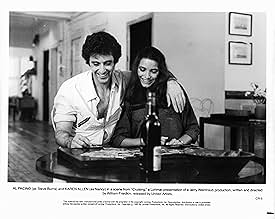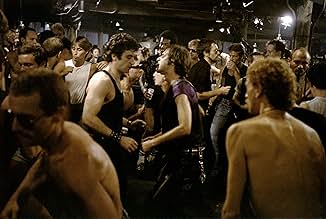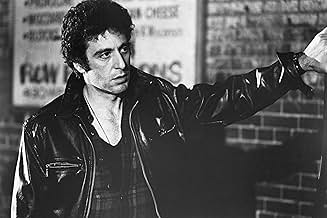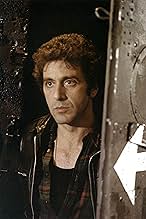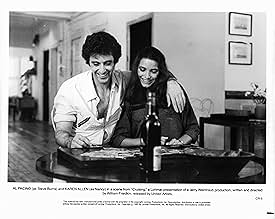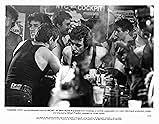Un detective de policía encubierto se adentra en la subcultura LGBT de Nueva York para dar caza a un asesino en serie que mata a hombres gais.Un detective de policía encubierto se adentra en la subcultura LGBT de Nueva York para dar caza a un asesino en serie que mata a hombres gais.Un detective de policía encubierto se adentra en la subcultura LGBT de Nueva York para dar caza a un asesino en serie que mata a hombres gais.
- Dirección
- Guión
- Reparto principal
- Premios
- 5 nominaciones en total
Ed O'Neill
- Det. Schreiber
- (as Edward O'Neil)
Reseñas destacadas
Crusing is a very dark psychological thriller from acclaimed director William Friedkin and leading man Al Pacino. Based on true events where a serial killer preyed on gay men part of the S+M gay leather scene in NYC, pre AIDS, where casual sex or cruising was a big thing in that scene. Al Pacino goes deep undercover to attempt to bring down the killer. This film only shows one side of the gay community, which was controversial and brought a polarizing reaction in the gay community in that time. The gay S+M clubs, parks and other areas of NY are the backdrop to this sleazy, violent and downbeat thriller. Al Pacino is excellent, as is the support cast of Paul Sorvino, Joe Spinell and Karen Allen as Pacino's girlfriend. The film is similar in a lot of ways to the Italian giallo films and it seemed to borrow some of its ambiance and style. While most of what happens in the film is pretty ambigious, it seems that as the film progresses Al Pacino seems to identify more with the gay community. This film is very well done and very much in the 70's style, gritty, suspenseful and uncompromising in its presentation. Crusing certainly will not appeal to everyone, but for those that like this kind of film, it is very well done.
Viewed today, "Cruising" still elicits intense responses from both Gay and straight viewers alike. Mainstream Gays lament, as many protestors of the film at the time of its release, that it shows a homophobic image of Gay life, depecting them as sex-obsessed. Straights are put off by the frank look at the Gay sex "cruising" culture.
Interesting, however, some of the people involved in the Leather/SM subculture at the time this film was made have praised it for its accuracy of this particular lifestyle -- a pre-AIDS lifestyle concentrated on quick sex that was (and still is) pursued by a segment of the Gay community.
The film does not pretend to depict Gays as a whole. It is just a drama about a police investigation that uses the scene as a background and catalyst for an exploration into how one cop is affected by his work.
Not the greatest film ever made, but certainly a good springboard for discussion about the Gay community's politics, when one fully examines the controversy surrounding the film and the continued debate over public sex and body image in the community.
The strengths of "Cruising" are its use of locales and documentary-style cinematography, as well as the interesting performance from Paccino. In the end, it is hampered as a drama by problems with the narrative structure of the piece that seems to fizzle out in the last act, leading to an intriguing, but inconclusive, finish.
Interesting, however, some of the people involved in the Leather/SM subculture at the time this film was made have praised it for its accuracy of this particular lifestyle -- a pre-AIDS lifestyle concentrated on quick sex that was (and still is) pursued by a segment of the Gay community.
The film does not pretend to depict Gays as a whole. It is just a drama about a police investigation that uses the scene as a background and catalyst for an exploration into how one cop is affected by his work.
Not the greatest film ever made, but certainly a good springboard for discussion about the Gay community's politics, when one fully examines the controversy surrounding the film and the continued debate over public sex and body image in the community.
The strengths of "Cruising" are its use of locales and documentary-style cinematography, as well as the interesting performance from Paccino. In the end, it is hampered as a drama by problems with the narrative structure of the piece that seems to fizzle out in the last act, leading to an intriguing, but inconclusive, finish.
When body parts of men start showing up in the Hudson River, police come to believe a serial killer is targeting gay men. Under intense pressure from the media, gay advocacy groups, the city's elected officials, Steve Burns (Al Pacino) is assigned to go undercover in the fringe S&M gay scene as he has a similar profile and build to the men being killed. As Steve adopts the alias of John Forbes, he finds himself further and further entrenched and drawn to the lurid allure of the scene.
Based on the 1970 novel Cruising by Gerald Walker, French Connection producer Philip D'Antoni had approached Friedkin earlier in his career only for Friedkin to turn it down due to lack of interest. D'Antoni then approached Steven Spielberg, but was unable to find studio backing. When the rights were bought by Jerry Weintraub years later, Friedkin had warmed up to the idea thanks to his exposure to a series of articles by Village Voice writer Arthur Bell as well as encounters with former police officer Randy Jurgensen who had done similar deep cover work to investigate a series of gay murders. Not only was the film prone to frequent conflicts with the MPAA to secure an R rating with nearly 40 minutes of deleted footage of explicit material in the various bars, but the film was also subject to massive protests and pickets from gay rights groups who characterized the film as homophobic and anti-gay. In the years since it's troubled release the film continues to be discussed and has found appreciation among directors such as the Safdie brothers, Nicholas Winding Refn, and Quentin Tarantino.
The movie is very giallo like with its lurid sexualized murders which are investigated in a way where the film is more concerned with crafting an atmosphere and sense of character as Friedkin captures the seamy side of New York's nightlife. While Al Pacino does well playing the audience proxy as he reacts to the world crafted by Friedkin's film, there is a sense that Pacino is a bit more secured in his sexuality than the filmmakers intended. As an experience the film is simply unforgettable.
William Friedkin's Cruising is a tense and thrilling film that captures its lurid atmosphere so vividly you can feel it with every scene. While the movie's loose structure and ambiguous payoffs will challenge viewers, in terms of craft of filmmaking Cruising has few equals.
Based on the 1970 novel Cruising by Gerald Walker, French Connection producer Philip D'Antoni had approached Friedkin earlier in his career only for Friedkin to turn it down due to lack of interest. D'Antoni then approached Steven Spielberg, but was unable to find studio backing. When the rights were bought by Jerry Weintraub years later, Friedkin had warmed up to the idea thanks to his exposure to a series of articles by Village Voice writer Arthur Bell as well as encounters with former police officer Randy Jurgensen who had done similar deep cover work to investigate a series of gay murders. Not only was the film prone to frequent conflicts with the MPAA to secure an R rating with nearly 40 minutes of deleted footage of explicit material in the various bars, but the film was also subject to massive protests and pickets from gay rights groups who characterized the film as homophobic and anti-gay. In the years since it's troubled release the film continues to be discussed and has found appreciation among directors such as the Safdie brothers, Nicholas Winding Refn, and Quentin Tarantino.
The movie is very giallo like with its lurid sexualized murders which are investigated in a way where the film is more concerned with crafting an atmosphere and sense of character as Friedkin captures the seamy side of New York's nightlife. While Al Pacino does well playing the audience proxy as he reacts to the world crafted by Friedkin's film, there is a sense that Pacino is a bit more secured in his sexuality than the filmmakers intended. As an experience the film is simply unforgettable.
William Friedkin's Cruising is a tense and thrilling film that captures its lurid atmosphere so vividly you can feel it with every scene. While the movie's loose structure and ambiguous payoffs will challenge viewers, in terms of craft of filmmaking Cruising has few equals.
Too many things wrong with this one to really care for it. The main problem is too much focus on over-the-top depictions of the gay S&M subculture, and not enough on its characters. The undercover cop (Al Pacino), his girlfriend (Karen Allen), and the killer (???) are all ridiculously underdrawn. We don't get enough of what's going through the cop's mind as he's undercover, the girlfriend is only there to serve as a barometer of his heterosexuality, and the killer has some cliché "daddy issues." We do, however, get public fisting ffs.
Especially for 1980, it's unfortunate that this was the window mainstream America got into gay life, as it felt voyeuristic and intended to shock, not serve as a source of understanding or empowerment, at least as best possible as a backdrop to a murder mystery. Maybe the neighbor character, the aspiring writer, was intended to balance some of this out, but he was quickly lost, perhaps by things like the ridiculous man in the precinct house wearing nothing but a jockstrap and walking into interrogations to slap gay suspects around. What the hell was that?
I loved the little bits critiquing the police department at various levels - the beat cops harassing guys on the street and forcing one to perform oral sex, the captain (Paul Sorvino) who too quickly looks the other way, and the chief of detectives who doesn't really empathize with the victims, only wanting to avoid untimely negative publicity. It's too bad more wasn't done with this, but maybe there was a moment of transformation in the captain finding that last body.
The story doesn't really hold together as a police procedural, however. Maybe the film didn't want us to think about Pacino's character having to go home with guys to be effective at his assignment, so a lot of the time, he's just standing around in a bar, watching the raunchy antics of the wild crowd. Early on we're made to understand he's working for the captain only, with no one else knowing about it, but then in one critical scene swarms of cops come to his aid - only to then disappear at the end, when he acts completely alone again. There are also attempts at adding ambiguity into the story in several ways, but they all felt more forced than intriguing.
It's Pacino's character that ends up being the real mystery. You could see this as a man whose bisexuality is awakened, that he goes home with enough men like the guy we see him following out of the park that he loses interest in his girlfriend, and then later knows the repartee well in the climactic encounter. You could also see it as a straight man who has been overwhelmed by what he's seen and done, so much so that his relationship suffers along the way, and even when he's back with her at the end, he's liable to suffering flashbacks and trauma. It was interesting pondering that, but it felt like the film was being less artistic in its ambiguity, and more inhibited by what it felt it could show in a 1980 Hollywood production with a big star like Pacino. Regardless, it was less than completely satisfying, like everything else here.
Especially for 1980, it's unfortunate that this was the window mainstream America got into gay life, as it felt voyeuristic and intended to shock, not serve as a source of understanding or empowerment, at least as best possible as a backdrop to a murder mystery. Maybe the neighbor character, the aspiring writer, was intended to balance some of this out, but he was quickly lost, perhaps by things like the ridiculous man in the precinct house wearing nothing but a jockstrap and walking into interrogations to slap gay suspects around. What the hell was that?
I loved the little bits critiquing the police department at various levels - the beat cops harassing guys on the street and forcing one to perform oral sex, the captain (Paul Sorvino) who too quickly looks the other way, and the chief of detectives who doesn't really empathize with the victims, only wanting to avoid untimely negative publicity. It's too bad more wasn't done with this, but maybe there was a moment of transformation in the captain finding that last body.
The story doesn't really hold together as a police procedural, however. Maybe the film didn't want us to think about Pacino's character having to go home with guys to be effective at his assignment, so a lot of the time, he's just standing around in a bar, watching the raunchy antics of the wild crowd. Early on we're made to understand he's working for the captain only, with no one else knowing about it, but then in one critical scene swarms of cops come to his aid - only to then disappear at the end, when he acts completely alone again. There are also attempts at adding ambiguity into the story in several ways, but they all felt more forced than intriguing.
It's Pacino's character that ends up being the real mystery. You could see this as a man whose bisexuality is awakened, that he goes home with enough men like the guy we see him following out of the park that he loses interest in his girlfriend, and then later knows the repartee well in the climactic encounter. You could also see it as a straight man who has been overwhelmed by what he's seen and done, so much so that his relationship suffers along the way, and even when he's back with her at the end, he's liable to suffering flashbacks and trauma. It was interesting pondering that, but it felt like the film was being less artistic in its ambiguity, and more inhibited by what it felt it could show in a 1980 Hollywood production with a big star like Pacino. Regardless, it was less than completely satisfying, like everything else here.
Knowing that this was inspired by true events and what really happened, I understand why the film may seem as one giant plot hole to some viewers. I know most people want a definitive answer and this movie doesn't exactly make it clear for the viewer. Done intentionally by Friedkin to reflect the true story's mystery, which I think is brilliant. That said, I wish the cast was hotter and I still can't believe Al Pacino did this film. I love it. It's such an amazing documented piece of Homosexual life before AIDS hit. Something we will never see or experience ever again.
¿Sabías que...?
- CuriosidadesTwo of the notorious gay bars featured in the film - Mine Shaft and Eagle's Nest - eventually barred William Friedkin.
- PifiasWhen the first victim gets stabbed blood is shown running off his shoulder but the knife is spotless.
- Citas
Steve Burns: Hips or lips?
- Créditos adicionalesThe film only opens with the title in large letters, across the screen. It is only at the end where the filmmakers are credited.
- Versiones alternativasUK cinema and 1987 video versions were cut by 54 secs by the BBFC. The 1997 Maverick Directors video release was cut by 39 seconds to remove subliminal shots of anal sex during the murder scenes (one of which appears in the film though heavily darkened) and to edit a pan shot of a gay bar interior and shots of a knife being traced over a bound victims body. Although the uncut version was shown by Sky TV the film was resubmitted to the BBFC in 2003 for a FilmFour showing and many cuts were restored apart from a 1 sec edit to remove the subliminal shots. For the initial release on UK DVD in 2008 all the cuts were waived.
- Banda sonoraThree-Day Moon
Performed by Barre Phillips
Selecciones populares
Inicia sesión para calificar y añadir a tu lista para recibir recomendaciones personalizadas
- How long is Cruising?Con tecnología de Alexa
- What's the deal with the big black guy in the jock during the interrogation scene?
- At the end of the movie, right after Capt. Edelson is in the murdered neighbor's apartment, we are shown from behind a tall guy in leather of similar appearance to the killer heading into a gay bar. What was that scene all about?
- Who murdered the red headed neighbor (Ted Baily) at the end of the movie? Was it the jealous roommate/boyfriend Gregory?
Detalles
Taquilla
- Presupuesto
- 11.000.000 US$ (estimación)
- Recaudación en Estados Unidos y Canadá
- 19.798.718 US$
- Recaudación en todo el mundo
- 19.815.488 US$
Contribuir a esta página
Sugerir un cambio o añadir el contenido que falta



